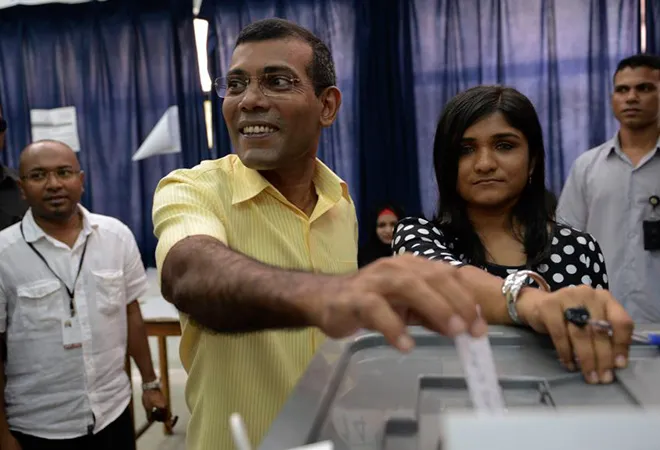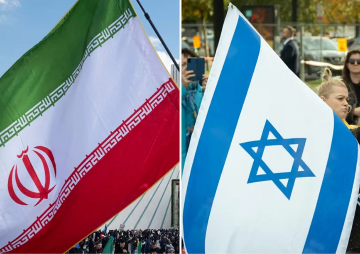
In Maldives, Opposition MDP boss Mohammed ‘Anni’ Nasheed’s call for a common ‘transitional presidential candidate’ to take on incumbent Abdulla Yameen in next year’s polls seems to have failed to enthuse and re-energise anyone inside or outside the four-party combine. The only reaction thus far has come from Yameen’s ruling PPM, with tweets claiming that Nasheed was now admitting that he himself cannot contest the elections, due by November 2018.
This is the second time that Nasheed has flagged the proposal for a ‘common candidate’. The first call was made in January. Though every political player in the Opposition should readily admit to the reality of the situation, none is as yet ready to endorse Nasheed’s call. The reasons are not far to seek.
First and foremost, anyone the combined Opposition seeks to promote as a common candidate is doomed to face adversarial Government action, aimed at getting him or her disqualified.
More importantly, and even less talked about, is the non-MDP apprehensions that Nasheed was seeking to foist a candidate of his choice first, so as to return to power himself early on, after getting his pending jail-term and consequent disqualification annulled under a ‘transitional president’.
There is no denying that the MDP is the single-largest party in the country, and Nasheed is possibly still the single most popular leader, cutting across age, class and gender. Yet, there is no denying that it is the ‘other votes’, now in the Opposition, like those of Gasim Ibrahim’s JP vote-share that made the difference to the final, second-round run-off results, in the presidential polls of 2008 and 2013.
‘Sirisena’ in hiding?
Under a Yameen law, which the MDP helped muster two-thirds majority in Parliament, Gasim is age-barred from contesting. It is so with Yameen’s estranged half-brother and former President Maumoon Abdul Gayoom, and a host of other possible candidates’ of the Opposition parties, combined or otherwise.
Granting that the MDP and the JP would back him, other probable candidates like Gayoom’s parliamentarian-son, Faaris Maumoon, are also facing court cases, hence possible imprisonment, followed by disqualification.
Considering that lawyers in Maldives are active in politics, as elsewhere in the democratic world, a recent Supreme Court decision to debar dozens of them at one go, and reviewing their re-induction in groups, can put off possible candidates from that clan, too.
The temptation for the Maldivian Opposition is thus to look for a ‘Sirisena’ model (Sri Lanka) from within the Yameen camp to project as their common candidate until the last-minute, when legal bar could become difficult to obtain, even in terms of the otherwise flexible procedures.
In neighbouring Sri Lanka, the combined Opposition, with help and assistance from the ‘international community’ (read: West), surprised incumbent President Mahinda Rajapaksa by co-opting his long-term political and ministerial aide, Maithiripala Sirisena, who is now in power.
The alternative could be to dig into the contemporary Maldivian past for the combined Opposition to identify a common, incorruptible candidate with ‘face recognition’ for a substantial section of the voters, for a last-minute campaign. Yet another possibility could be a surprise candidate, capitalising on the gender-freedom that the 2008 ushering in of democracy entails, even if such a one may not be known to too many Maldivians, now or later.
Conditional clause
The question is if any or all of them, if identified and persuaded in private ahead of the poll-notification, would agree to be self-effacing ‘transition president’ on record even if they acknowledge his/her role to be precisely the same. If he or she has to win against incumbent Yameen, he needs more than the combined Opposition’s calculated vote-share -- and not without reasons.
If such a candidate exists, for victory over incumbent Yameen, he or she has to come with a lot of promise for the ordinary voter whatever be the latter’s political loyalty at present. Such a candidate, if elected President, cannot be expected to sign on the dotted line, nor is he or she going to walk away after defeating the incumbent, if it came to that.
At least, this should be the assumption, both within and outside the MDP, especially after Nasheed’s past experience with his Vice-President Mohammed Waheed Hassan Manik, when he was elected to office in 2008.
No self-respecting Maldivian, career politician or otherwise, is likely to accept such humiliating term(s) as ‘transitional President’, entailing him/her to reform the judiciary and governance system, as desired by Nasheed now – and quit afterwards.
Transferrable votes
It is also not without reason that Nasheed has to qualify his call for a common candidate with the ‘transition’ clause. His MDP cadres’ loyalty to the party, and even more so to the leader, is well known. Convincing them to vote and work for a candidate and party other than theirs (even if the chosen one is from the MDP) is not easy even in the face of ‘threats of Yameen’s continuance’.
The question thus remains if Nasheed has ‘transferrable votes’ in his core-kitty for a candidate acceptable to him and the party, whether or not from the MDP.
The same applies to JP’s Gasim Ibrahim, who upped his first-round vote-share from 15 per cent to 25 between 2008 and 2013, and also ensured that all those votes went to Nasheed and Yameen, respectively, making their victory possible.
Apart from Gasim, 2008 saw ‘Independent’ Hassan Saeed obtaining 16 per cent votes in the first round, which he could transfer in toto to Nasheed in the second run-off round. Unlike Gasim, Saeed lost his vote-share near-permanently to the MDP, especially after his three-leader combine went separate ways.
Of the other two, Dr Shahid joined hands with Nasheed and the MDP and is at present on a UN assignment on democracy in Iraq. Dr Mohammed Jameel Ahmed joined hands with the PPM and Yameen, became his Vice-President in 2013, and is now in self-exile in the UK.
Indecision, instability
Then there is the larger question of ‘new Maldivians’ of vintage 2008 to vote for a ‘transitional president’ propped up by Nasheed and the MDP. These votes wee with them both in 2008 but got so cut up with the two for not living up to the promises, aspirations and expectations, readily voted for Gasim or Yameen, especially in urban Male, in the 2013.
They may not want to vote for Yameen now, given their own preference for democracy, but they may not also want to vote for indecision and instability. This could mean that the electoral turn-out, especially of the young voters that are not first-timers could go down the next time round, if the Opposition does not come up with a ‘stable candidate’.
Such a candidate would have to inspire confidence in the voters, and also inspire a sense of upcoming change – for the better – all round. Such ‘change’ should focus as much on development a la Yameen as democracy.
On the development platform, Yameen has a better, if yet-to-be proven track-record. His Government’s China-funded ‘development projects’ like the Male-Airport sea-bridge, has a lot to impress the all-island voter in the short term, whatever be the fiscal and economic commitments over the medium and long terms.
Against this on the rival/alternate democracy platform, the MDP and Nasheed failed their voters and the nation when they did not live up to their promises and expectations. If anything, they were so full of themselves while in power, individually and collectively, that they could not even complete their full term – and ended up blaming everyone else for their inherent shortcomings.
Memories from the past would still weigh in the minds of Gayoom and other Opposition parties, groups and leaders as they consider Nasheed’s new proposal with the seriousness it otherwise deserves. It would be equally so in the case of the common candidate that Nasheed wants them all to identity and back for a ‘transitional’ job (and term?).
The views expressed above belong to the author(s). ORF research and analyses now available on Telegram! Click here to access our curated content — blogs, longforms and interviews.




 PREV
PREV


